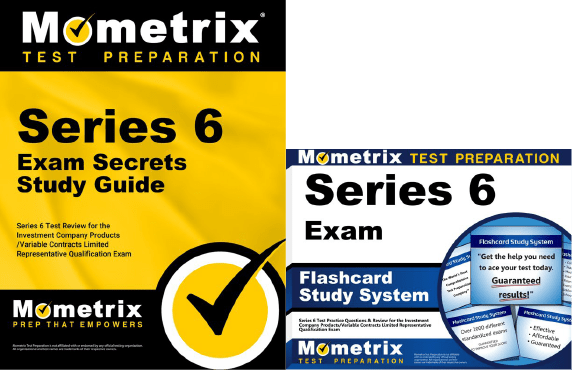If you need help studying for the Series 6 exam or just want some more information about what the exam is like, you’ve come to the right place.
Click below to take a free Series 6 practice exam!
What’s on the Series 6 Exam?
How to Register
Exam Scores
Retaking the Test
What Test-Takers Are Saying
FAQs
Test Eligibility
Before you can register to take the Series 6 exam, you’ll need to be sponsored by either a FINRA member firm or an SRO member firm.
Once you’ve confirmed sponsorship, you’re set to begin the registration process!
What’s on the Series 6 Exam?
First, let’s talk about the questions on the exam. There are 55 multiple-choice questions total, but only 50 of the questions will count toward your score. Why is that?
The 5 unscored questions on the Series 6 exam are called “pretest” questions. These are added to the tests to determine if they’re good enough questions to add to future versions of the test.
The trick is that you won’t have any way of knowing which questions are scored and which ones are pretest. They will appear just like the scored questions throughout the test.
The time limit for the exam is 1.5 hours. There aren’t any scheduled breaks, but you’re free to take restroom breaks as needed.
Let’s take a closer look at the different sections of the Series 6 exam.
1. Seeks Business for The Broker-Dealer from Customers and Potential Customers
12 scored questions
- Contacting current and potential customers
- Describing investment products and services to customers
2. Opens Accounts After Obtaining and Evaluating Financial Profile and Investment Objectives
8 scored questions
- Informing customers of the types of accounts
- Obtaining and maintaining customer information and documentation
- Obtaining customer investment profile information
- Obtaining supervisory approvals required to open accounts
3. Provides Customers with Information About Investments, Makes Recommendations, Transfers Assets, and Maintains Records
25 scored questions
- Providing information about investment strategies
- Providing information about risks and rewards
- Reviewing and analyzing investment profiles and product options
- Providing disclosures pertaining to investment products
- Communicating about account information
- Retaining documentation
4. Obtains and Verifies Purchase and Sales Instructions and Agreements; Processes, Completes, and Confirms Transactions
5 scored questions
- Providing current quotes
- Processing and confirming transactions pursuant to regulatory requirements
- Informing customers of delivery obligations and settlements
- Informing the appropriate supervisors
- Resolving discrepancies, errors, complaints, and disputes
How to Register
Once you’ve ensured that you meet all of the eligibility requirements, your firm will register you for the exam via the CRD program.
Exam Scores
The test is scored using the Angoff method. Here’s how it works:
The Angoff method involves a group of subject-matter experts taking an educated guess at the percentage of candidates who would correctly answer each question on the test. These estimates are then averaged to set a cut-off score, which test-takers must meet or exceed to pass.
This method aims to ensure the pass threshold reflects the level of knowledge or skill that is deemed minimally acceptable for a particular profession or field.
Retaking the Exam
If you didn’t get a passing score on your first try, that’s okay! You can retake the test after a 30-day waiting period.
Keep in mind that you will have to pay the full testing fee every time you retake the test.
What Test-Takers Are Saying
Don’t just take our word for it! See what real test-takers are saying about the Series 6 exam:
“A lot of the exam was about eliminating wrong answers and making educated guesses. Some topics that were on my test include taxation on DRIP, risk with ADRs, retail vs. institutional communication, who is involved in arbitration, and the best investment option for a client that skips the 401(k) with a match.”

winteriscold1976
“Be very, very comfortable with NAV & POP, tax treatment of different events, suitability, open/close end accounts, and proper customer account handling concepts. The wording on the exam is very convoluted, so you really have to know your concepts well to pass.”

SunshineFlames
“In order to pass this exam, you REALLY need to have a deep understanding on mutual funds, life insurance/annuities, suitability, and communications. My test was heavy on mutual funds and suitability. I saw a few questions on communications and records retention, and a few on annuities.”

GoodSpaceFellow
“My set was heavy on mutual funds and annuities, not much for life insurance. I probably got two questions on suitability. It was mostly a review of SIE content.”

Quirky-Steak-3700
FAQs
How many questions are on the Series 6 exam?
The exam contains 55 questions.
What is the time limit for the Series 6 exam?
The exam is timed at 1.5 hours.
What is the passing score for the Series 6 exam?
You’ll need to get a final score of at least 70 to pass.
How much does the Series 6 exam cost?
The testing fee is $100.
Mometrix Test Preparation is not affiliated with or endorsed by any official testing organization. All organizational and test names are trademarks of their respective owners.



 Series 6 Study Guide
Series 6 Study Guide Series 6 Flashcards
Series 6 Flashcards